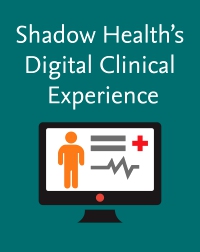
Pharmacology Digital Clinical Experiences - Access Card, 1st Edition
Shadow Health - Access Card

Shadow Health’s Digital Clinical Experiences™ for Pharmacology allow students to see pharmacology in context, providing a safe, convenient, and dynamic environment to practice their documentation, communication, and clinical reasoning skills. Each scenario has a patient case that mirrors the complexity of a real patient, with a wide variety of medications that they are likely to encounter in professional practice. An innovative conversation engine gives students the opportunity to interact with a breathing, speaking patient who is relying on them to provide safe, responsible care. This enables students to become more efficient in their patient interactions while maintaining high-quality therapeutic communication and care planning. Assignments are designated by levels, based on the complexity of the patient case and activities, from basic to complex. These meaningful interactions help students gain valuable experience in practical application, patient communication, and personal empathy, empowering them to improve patient outcomes and prepare to enter clinical practice.
-
- Digital Standardized Patients™ vary in age, race, socioeconomic status, gender identity, and sexual orientation, and have health histories and diseases/disorders that support students’ mastery of nursing principles in a wide spectrum of medical situations.
- Natural language conversation engine allows students to engage in open-ended conversations with simulated patients to gather subjective data and practice patient-centered communication.
- Student Performance Index provides instructors and students with immediate, detailed feedback on six key components of clinical reasoning — subjective data collection, objective data collection, therapeutic communication, documentation, information processing, and self-reflection — to identify areas of strength and opportunities for remediation.
- Interview and Assessment activities allow students to demonstrate their clinical reasoning abilities by performing a health assessment on virtual patients to collect objective data and report their findings in the electronic health record.
- Care Plan exercises enable students to use assessment data to work through the steps of the ADPIE process and select appropriate care actions from a standard set of components.
- Medication Administration exercises help students develop critical thinking skills to improve patient safety using a safe medication framework to administer drugs via several routes, including oral, injection, and intravenous.
- Medication Math activities promote patient safety by improving student competency in medication calculation using calculation questions that relate to medications ordered in the patient scenarios.

 as described in our
as described in our 